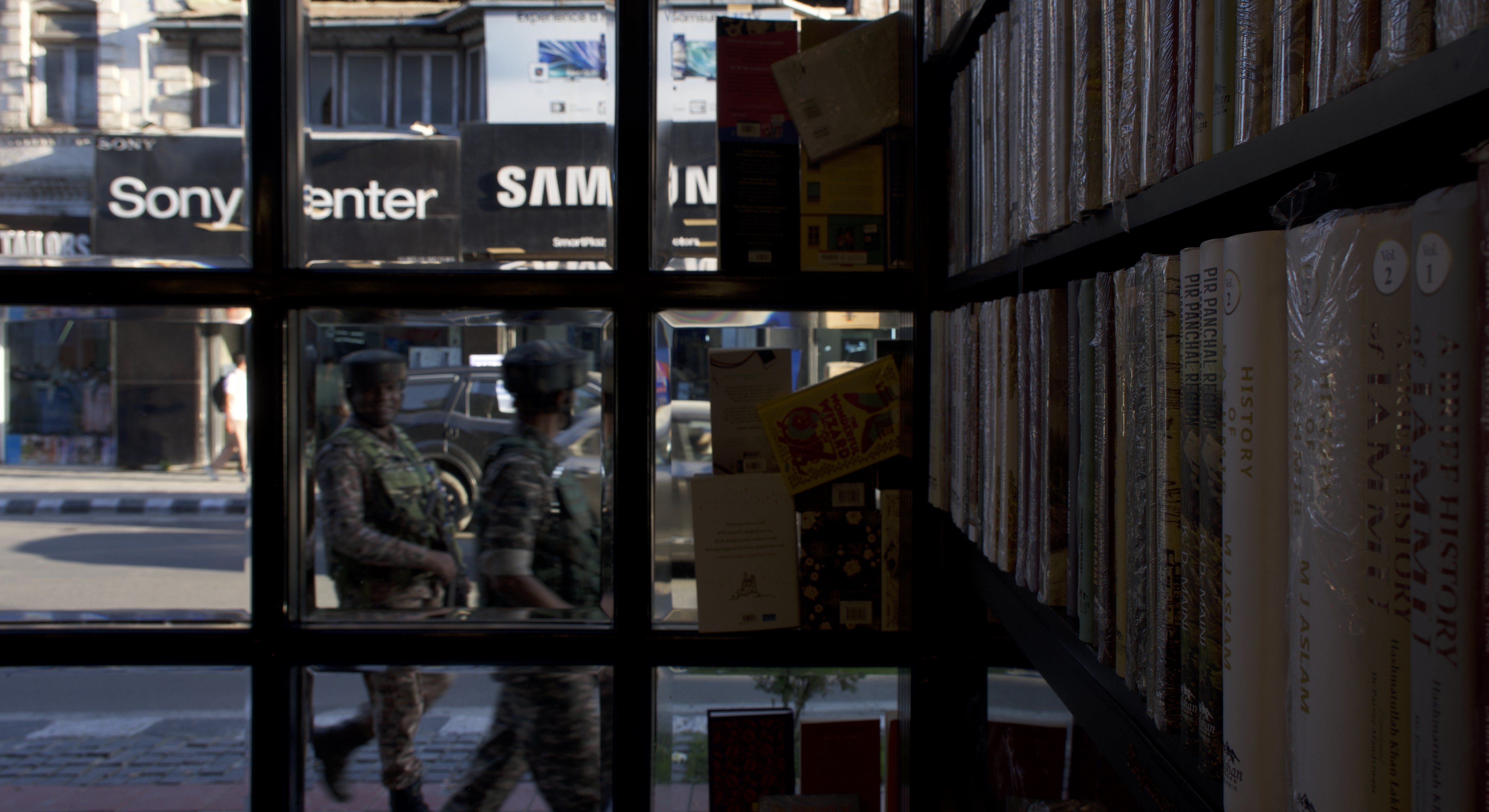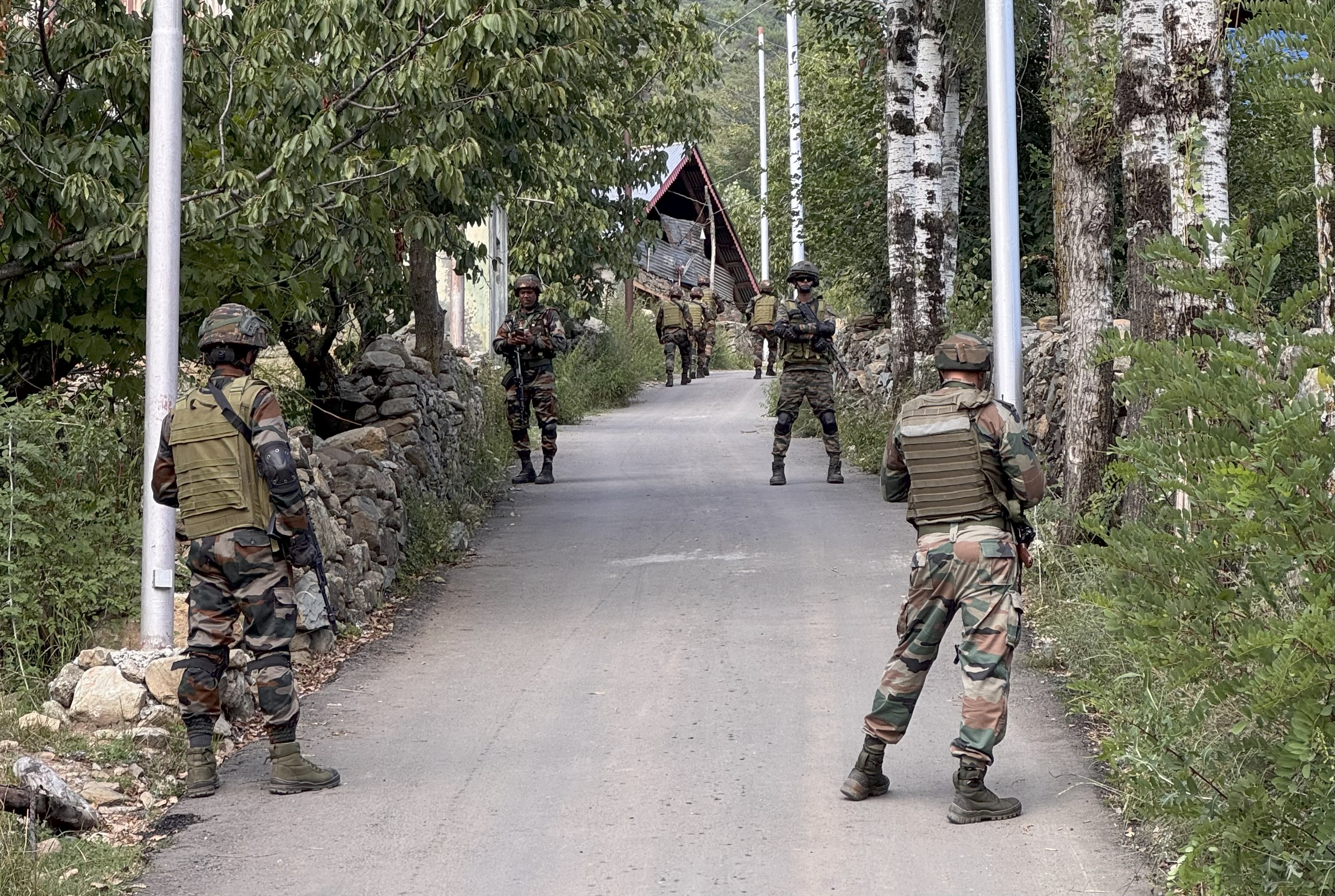Two pieces of news are flashing on screens beside each other in Srinagar, Kashmir. One is about security forces engaging in a fierce gunfight with anti-India rebels in Indian-administered Kashmir’s Kulgam district – and the other about Jammu and Kashmir’s Home Department announcing a ban on 25 books on the orders of Lieutenant Governor Manoj Sinha.
These two pieces of news may not seem linked to each other. However, according to Sinha, the now-banned 25 books are to blame for cyclic violence in Kashmir.
Not long ago, Sinha himself took full responsibility for the security lapse that allowed the attack in Kashmir’s Pahalgam on April 22. Today, he is implying that books are to blame for terrorism in the valley.
In Kashmir, August 5 has become a painful reminder to the residents of the region that their relationship with India was changed at the constitutional level, by fiat from the center and very much against public opinion. This year, the same day was chosen announce this book ban.
The order declaring the ban on the 25 books slammed “secessionist literature.” Through “its persistent internal circulation, the books, often disguised as historical or political commentary, play a critical role in misleading the youth, glorifying terrorism and inciting violence against Indian State,” the announcement said.
Critics disagree. Experts say these books – by Kashmiri, Indian, as well as international authors – provide balanced answers to various questions on the how, what, where, why and when of the seven-decade old conflict zone. Books such as “Azadi” by Booker Prize winner Arundhati Roy, “Human Rights Violations in Kashmir” by Piotr Balcerowicz and Agnieszka Kuszewska, “Resisting Disappearance” by Ather Zia, “Colonizing Kashmir: State Building Under Indian Occupation” by Hafsa Kanjwal, “A Dismantled State: The Untold Story of Kashmir After Article 370” by Anuradha Bhasin, and “The Kashmir Dispute: 1947-2012” by A.G. Noorani call out the Indian state on its historical and political excesses in Kashmir.
The region’s administration has now declared these books as “forfeited items.”
“Bizarre, Absurd Ban”
According to the order, this literature deeply impacts the psyche of the youth by promoting a culture of grievance and victimhood, while valorizing terrorism. The order claimed, “Some of the means by which this literature has contributed to the radicalization of youth in J&K include distortion of historical facts, glorification of terrorists, vilification of security forces, religious radicalization, promotion of alienation, pathway to violence and terrorism.”
This recent ban is not the first. In January, a similar ban was placed on certain Islamic books in Kashmir. The local police raided dozens of bookstores and seized more than 650 books as part of crackdowns on dissent in the Indian-administered region. Most of these books were penned by Abul Ala Maududi, a prominent 20th-century Islamic scholar who founded Jamaat-e-Islami, an Islamic organization banned in Kashmir.
The co-author of the now banned book, “Human Rights Violations in Kashmir,” Piotr Balcerowicz believes that the state is seeking complete control of news and information in India. “Full control of the circulation of books, by eliminating some of them from the market by banning them, has a clear aim: to achieve absolute control of the information,” Balcerowicz told The Diplomat. He said the state was pursuing “the monolith of propaganda.”
“This is precisely that kind of dystopia which George Orwell described in ‘Nineteen Eighty-Four,” Balcerowicz continued. “The ban is a clear step in this direction, toward an authoritarian state. It does not serve the interests of India at all.”
For Anuradha Bhasin, author of the now banned “A Dismantled State: The Untold Story of Kashmir After Article 370,” the ban was born out of the state’s paranoia. “They want to control, they want to manipulate everything, and they do not want any dissenting voices. All their actions in the region stem from the fear of being countered. There has been an attempt to silence anything and everything that questions their narrative,” Bhasin said.
“First, they came for journalism, now it’s books.”
Bhasin also remarked that if extremist, Hindu supremacist books were allowed to be freely read and sold in India, books by well-established authors should not be banned. Bhasin sees the ban as “whimsical, bizarre, and absurd” at best.
“Kashmiris already live with a deep sense of fear and surveillance; this ban is going to deepen that. This is bound to discourage people from reading, writing and working on books,” Bhasin said.
The Jammu and Kashmir Police have raided several locations across Kashmir to seize the banned books. Farhan, a student at University of Kashmir is scared; he is in possession of at least four of the now incriminating books. Many of the authors interviewed for this story believe that fear is the point.

Indian paramilitary personnel patrol outside bookshops in Srinagar following police raids on several stores after authorities banned 25 books in Indian-administered Kashmir. Photo by Zubair Dar.
“Criminalizing History and Lived Realities”
The Kashmir conflict is one of the oldest living conflicts in the world, circling back to 1947, when the British left the Indian subcontinent; the ensuing Partition created two forever antagonist nations – India and Pakistan. Ever since, Kashmir has been pulled between India’s quest for territorial control and Pakistan’s pursuit to broaden religious affinity. Today, both states claim the region in its entirety; in practice, it is divided into Indian-administered and Pakistan-administered parts.
Hafsa Kanjwal’s now banned book “Colonizing Kashmir: State Building Under Indian Occupation” explores the genesis of the conflict. Kanjwal delved into Kashmir’s post-Partition history, by examining how everyday life, cultural tools, and economic dependency were harnessed to solidify control over the region. Her book questions how states are formed – not simply coerced – and how sovereignty can be manufactured rather than agreed upon.
Speaking to The Diplomat, Kanjwal said that the censoring of knowledge has only escalated since 2019, with the clampdown within Kashmir. “There is a desire to quash any form of independent thinking or any narrative that does not align with the Indian government’s narrative of normalcy or Kashmir being an ‘integral’ part of India,” she said.
Pointing out that the government has already gone after human rights defenders, journalists, civil society activists and many others, Kanjwal views the book ban as a continuation of other policies that seek to restrict the flow of information on and within Kashmir in order to cultivate state propaganda. “The state officials think that by the ban, Kashmiris will miraculously forget that they have a history and a freedom struggle. While the government may succeed in creating a state of panic, confusion, and fear within Kashmir, it will not succeed in erasing this history,” she told The Diplomat.
Another author who now finds her book banned in the region is Ather Zia. Her work “Resisting Disappearance” is an ethnographic study that emerged from Zia’s decade-long engagement with the Association of the Parents of Disappeared Persons (APDP) in Kashmir. The book follows mothers and “half-widows” – women whose husbands have disappeared – highlighting their activism as they search for missing loved ones and challenge the government’s enforced disappearances.
Zia perceives the ban as an attempt to erase the narratives, testimonies, and experiences of Kashmiris. “What is being criminalized here is history, memory, lived realities, and truth-telling. This move reflects a larger pattern that has been unfolding in Kashmir, where knowledge that challenges and unsettles the statist narrative is deemed dangerous,” Zia explained.
Zia believes that the Indian state has a hunger for control, which is not satiated just through militarization and surveillance, but also in the symbolic and discursive realm. “By banning books that emerge from a Critical Kashmir Studies perspective – [books] that document enforced disappearances, gendered resistance, mass graves, and the architecture of military occupation – the state seeks to sever Kashmiris from their histories and the world from understanding those histories,” Zia told The Diplomat.

Indian paramilitary personnel stand guard near the site of a gun battle in Harwan Dara, on the outskirts of Srinagar, on July 28. Photo by Zubair Dar.
Fear and Façade
Kashmiri academics feel that the banning of books is anything out of the ordinary. A Kashmiri historian and academic said, “There’s a binary at play. On the one hand, the government inaugurates the Chinar Book Festival, claiming to facilitate a culture of reading among Kashmiris, while on the other hand it proscribes scholarship and critical thinking.”
The scholar added that state-backed celebrations of Kashmiri culture were all a façade, calling out the center for facilitating Sufi narratives that suited its politics and policies. “Those scholars and historians who have questioned this have faced severe consequences,” he concluded. “The banning of the books is therefore nothing surprising but an extension of measures that are very familiar and well known.”
Right after the order was received by the police, uniformed men began raiding bookstores across several parts of Kashmir to seize these books, the possession of which now breaks several sections of the Indian Penal Code: acts endangering the sovereignty, unity and integrity of India; the offense of promoting enmity between different groups; and actions that are prejudicial to national integration – as per the order.
Kashmir’s former education minister, Naeem Akhtar argued that such a ban would criminalize genuine scholarship, implying that the ban would push people to consume “third-rate propaganda” as a window to view Kashmir.
“A. G. Noorani is the most authentic scholar and exponent of Kashmir’s post-independence history. The amount of scholarship he’s produced should be a source of pride for any country,” Akhtar said, commenting on the ban. “By denying access to him, our youth are led up the wrong path where legal argument and civilized debate is at a discount.”
He also believes the ban cannot succeed in erasing a history now viewed as inconvenient by the state: “In any case Kashmir is all about collective memory of a centuries-long struggle for identity and dignity. Even if all the books were burned that memory still survives.”

































